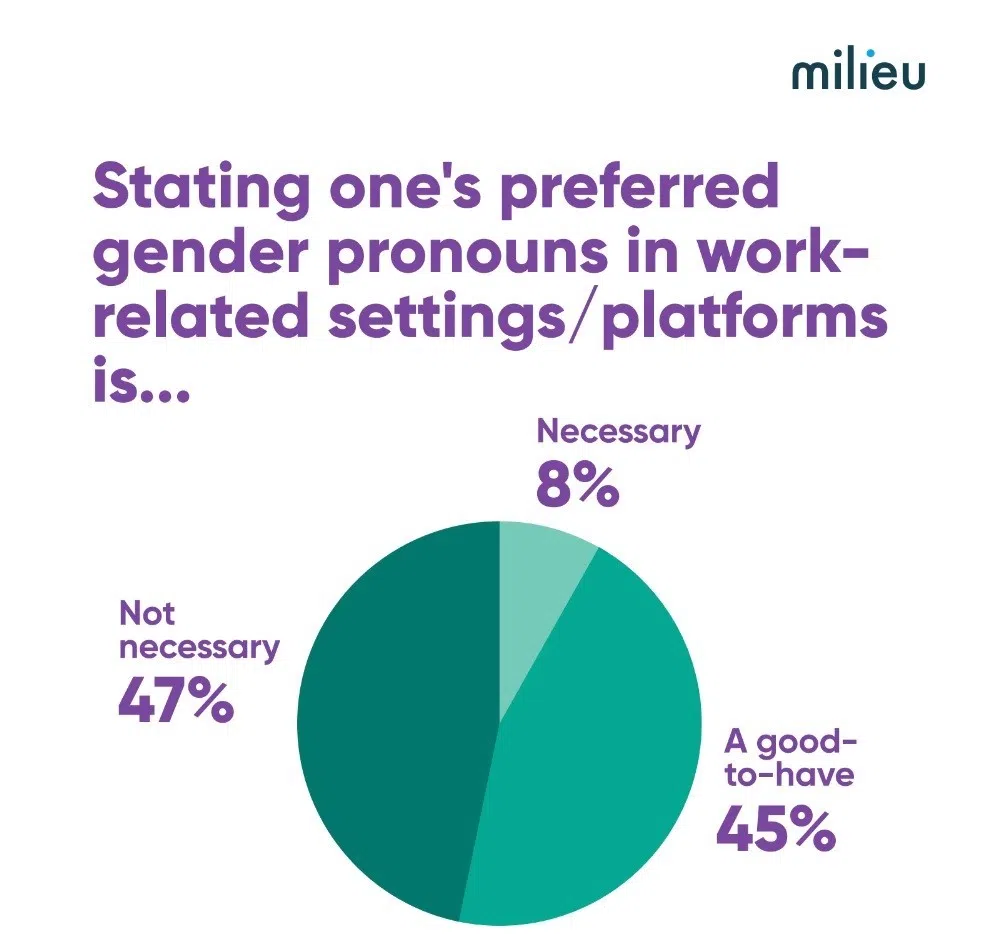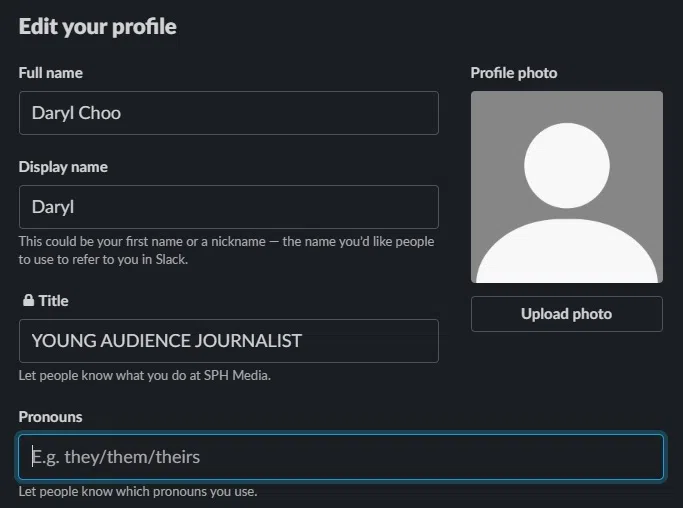🤝 What to do when a colleague tells you their pronouns

- Find out more and sign up for Thrive at bt.sg/thrive
⚥ Pronouns at work
The repeal of Section 377A, a colonial-era law that criminalised gay sex, has opened up national conversations about LGBT+ issues. But beyond the softening of attitudes towards same-sex relationships, issues of gender identity faced by transgender and non-binary people have also gained ground.
While the traditional thinking around gender identity is whether a person identifies as male or female, some may instead view gender as a spectrum and identify as non-binary. Often, such individuals prefer to use “they/them” pronouns.
With inclusivity becoming an important value for companies, the use of inclusive language has become more prevalent in the workplace. In a survey of 1,000 employees last year by Milieu Insight, more than half said that stating one’s pronouns in work settings was either necessary or good to have, with almost a quarter saying they personally do so.

Veteran HR practitioner Carmen Wee tells me that employers are becoming more mindful 🔎 of the generational shift in mindset towards gender identity.
While more companies around the world are paying more attention to inclusivity, the chief executive of HR advisory firm Carmen Wee and Associates said that in Singapore, HR policies and issues surrounding the use of pronouns have not come up as a major area of interest yet.
Still, companies have varying stances on LGBT+ issues. Wee notes that many multinational Western companies, for instance, are often more accepting of the use of chosen or gender-neutral pronouns.
Beliefs around gender identity are deeply personal. But LGBT+ rights groups say that just because you don’t agree with a colleague’s beliefs on gender identity doesn’t mean you can’t stay respectful and professional.
“This is called professional behaviour, and applies to any workplace,” says Leow Yangfa, executive director of counselling and support group Oogachaga.
⛔ There’s a line that must be drawn between disagreements over beliefs and flat-out bullying or discrimination. Wee said employees who believe they are being bullied or discriminated against should make use of their company’s whistleblowing channels or – if it comes down to it – lodge a complaint with the employment watchdog, the Tripartite Alliance for Fair and Progressive Employment Practices.
❌⭕ Do’s and don’ts
Pronouns matter because they are central to a person’s identity. Misgendering, or calling someone by the wrong gender, can bring up trauma for people who have changed their pronouns or name, rights groups say. Doing so can also leave them feeling invalidated or undermined.
Here’s what rights groups say about how you can be respectful of a colleague’s gender identity:
How should I react when someone comes out to me in the workplace?
Benjamin Xue, co-founder of queer youth community group Young Out Here: “When someone comes out to you, it’s usually a sign that they are inviting you into a conversation that is both special and vulnerable to them.
“Words like ‘Thanks for sharing that with me’, or ’I’m sure your coming out journey hasn’t been easy. Thanks for trusting me with that information’ do help and can hopefully create a stronger relationship with your colleague.”
Leow: “Check with the person who has just come out to you, who else at work they may have come out to, and if they need any support.
“If there are others in the workplace whom they have not come out to, it is not your role to encourage them to come out, or worse still, disclose the information on their behalf.”
Is it disrespectful to ask someone for their pronouns?
Leow: “No, it is not disrespectful to ask for someone’s pronouns. Just like with names, sometimes there may be situations where we may have to ask.
“For example, you can say: ‘Hello, my name is Yangfa, my pronouns are he and his. What’s your name and what are your pronouns, please?’”
What questions should I avoid asking transgender or non-binary people?
Leow: “As in most professional and social settings, it is usually disrespectful to ask personal questions that are irrelevant or intrusive, such as questions about people’s body parts, medical history and deadnames.
“A deadname is the name that a transgender, non-binary or gender-diverse person may have been given at birth but no longer use.”
Xue: “Asking questions like ‘What was your previous gender’, or ‘Have you had the surgery’, are really unhelpful in forging a closer relationship with people in the workplace.
“(Such questions) can be intrusive and downright inappropriate.”

What should I say when I accidentally misgender a colleague?
Jean Chong, co-founder of queer women’s rights group Sayoni: “Apologise and correct yourself immediately. I don’t think anyone will be too upset with an honest mistake.”
Leow: “There is no need to give an explanation or excuse, as that is not necessary. You may choose to give an assurance that it should not happen again, as you are learning more about how hurtful misgendering can be.”
What if my colleagues choose to ignore my preferred pronouns? Do I have legal recourse?
Doris Chia, managing director of DC Law: “There is no law in Singapore that compels someone to call you by your preferred pronoun unless your boss insists on calling you by a male pronoun when you are legally female (according to your IC). In that case, that would be considered workplace harassment.
“While most Singaporeans are respectful of someone’s sexual orientation, there are obviously some people who may be less accepting, especially those from the older generation.
“Disputes can arise when a company insists that you use a different toilet or adhere to a certain dress code (for example, women must wear skirts or dresses), but frankly there is nothing much an employee can do.
“While there is no law that requires people to accommodate one’s pronouns, there is still reputational risk to consider for employers that choose to be unwelcoming to people of diverse sexual orientation and gender identities. Like in a recent case where someone made discriminatory comments to a mixed-race couple, discriminatory conduct of employers due to an employee’s sexual orientation or gender identity may cause it to attract unwanted attention.”

To be clear, blunders can still happen even to the most careful among us, and we could still slip up or say something insensitive. What matters is that one makes the effort to do better – people are usually understanding about honest mistakes, say rights groups. There is no need to walk around on tiptoes with the fear of being “cancelled” just because it’s new ground for you.
At the end of the day, being respectful to your colleagues is something that any employee or rather, human being, should be practising regardless of your personal beliefs. And this extends beyond your beliefs surrounding LGBT+ issues.
As Leow puts it: “I am a vegetarian and proud of it.
“While I do not agree with the principle of factory farming and people choosing to eat meat, it doesn’t stop me from sitting with non-vegetarians to eat together, nor does it prevent me from respecting them as fellow diners and human beings too.”
TL;DR
- In a recent survey, almost a quarter of employees here said they state their pronouns in work settings
- Calling someone by the wrong gender can make someone feel invalidated or undermined
- LGBT+ rights groups say it’s okay to ask someone for their pronouns in a work setting if you’re unsure
- Just because you have different views on gender identity doesn’t mean you can’t stay respectful and professional
Copyright SPH Media. All rights reserved.